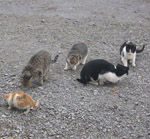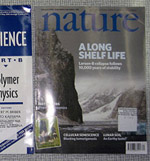Study links cancer mortality rates with ecological integrity of streams
 Freshwater
Freshwater  The Guyandotte River in southwestern West Virginia where cancer rates are high and stream ecological integrity is poor. Image credit, Steve Kiser.A new study from West Virginia has found a significant relationship between the cancer mortality rates in local communities and the ecological integrity of nearby streams.
The Guyandotte River in southwestern West Virginia where cancer rates are high and stream ecological integrity is poor. Image credit, Steve Kiser.A new study from West Virginia has found a significant relationship between the cancer mortality rates in local communities and the ecological integrity of nearby streams.
Researchers looked at an index of stream ecological condition and found that it correlated with digestive, breast, respiratory, and urinary cancer mortality rates.
The study also found a relationship between the amount of nearby coal mining and both stream health and cancer rates. This suggests that coal mining may be the underlying cause of both problems.
This study merits media attention because it provides empirical evidence of the negative public health and ecological consequence of coal mining.
However, this study is also important because it shows that measurements of stream ecological integrity can serve as a warning sign of underlying environmental problems that are causing cancer in local populations.
Often these environmental stressors are difficult to otherwise detect.
Ecological integrity in streams refers to a specific ecosystem state "with species composition, diversity, and functional organization comparable to that of natural habitats within the region."
In terms of water quality assessments, scientists often sample the species composition of macroinvertebrates, organisms visible to the naked eye living at the bottom layer of streams - e.g. crustaceans and insects.
Macroinvertebrate communities are sensitive to pollution and can provide indications of contamination not observable from chemical testing. This happens "because biota are exposed to multiple physical and chemical conditions simultaneously and therefore provide an integrated measure of environmental quality."
Nathaniel Hitt from Virginia Tech and Michael Hendryx from the University of West Virginia University looked at a stream condition index (SCI) that has been measured across the state based on 6 metrics of macroinvertebrate community structure.
They aggregated the values to the county level to compare them against public records on cancer mortality rates. They also compared both SCI values and cancer rates against a metric of coal mining activity by country.
The researchers found significant relationships between the SCI values, cancer mortality rates, and the coal mining index.
In addition they conducted spatial analyses and "found cancer clusters that corresponded to areas of high coal mining intensity."
Based on their findings the authors write,
"Assessments of ecological integrity therefore may contribute not only to monitoring goals for aquatic life, but also may provide valuable insights for human health and safety."
However, more research is needed to see if this relationship holds in other geograpic settings. Hitt and Hendryx note that a recently developed ecological integrity dataset for all of North America provides scientists with this opportunity.
--by Rob Goldstein
Hitt, N., & Hendryx, M. (2010). Ecological Integrity of Streams Related to Human Cancer Mortality Rates EcoHealth DOI: 10.1007/s10393-010-0297-y




Reader Comments